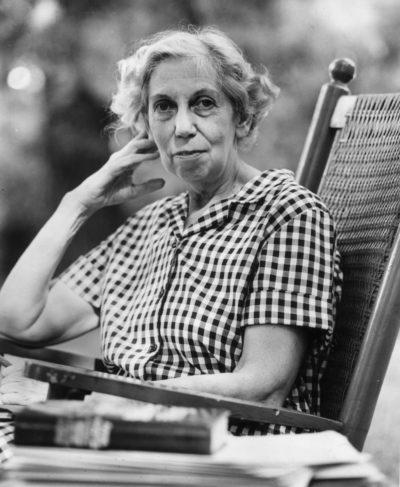Eudora Welty (Eudora Alice Welty)

Eudora Welty was born in Jackson, Mississippi on April 13, 1909, the daughter of Christian Webb Welty (1879–1931) and Mary Chestina (Andrews) Welty (1883–1966). She grew up with younger brothers Edward Jefferson and Walter Andrews. Eudora’s mother was a school teacher. Eudora soon developed a love of reading, reinforced by her mother who believed that “any room in our house, at any time in the day, was there to read in, or to be read to”. Her father, who worked as an insurance executive, was intrigued by gadgets and machines and inspired in Eudora a love of all things mechanical. She later would use technology for symbolism in her stories and would also become an avid photographer, like her father. Near the time of her high school graduation, Eudora moved with her family to a house built for them at 1119 Pinehurst Street, which would remain her permanent address until her death. Wyatt C. Hedrick designed the Weltys’ Tudor Revival style home, which is now known as the Eudora Welty House. From 1925 to 1927, Eudora Welty studied at the Mississippi State College for Women, then transferred to the University of Wisconsin to complete her studies in English literature. She studied advertising at Columbia University at the suggestion of her father. Because Welty graduated at the height of the Great Depression, she struggled to find work in New York.
Soon after Eudora Welty returned to Jackson in 1931, her father died of leukemia. She took a job at a local radio station and wrote about Jackson society for the Memphis newspaper Commercial Appeal. In 1935, she began work for the Works Progress Administration. As a publicity agent, she collected stories, conducted interviews, and took photographs of daily life in Mississippi. She gained a wider view of Southern life and the human relationships that she drew from for her short stories. During this time she also held meetings in her house with fellow writers and friends, a group she called the Night-Blooming Cereus Club. Three years later, she left her job to become a full-time writer. In 1936, she published “The Death of a Traveling Salesman” in the literary magazine Manuscript, and soon published stories in several other notable publications, including The Sewanee Review and The New Yorker. She strengthened her place as an influential Southern writer when she published her first book of short stories, A Curtain of Green. Her new-found success won her a seat on the staff of The New York Times book review as well as a Guggenheim Fellowship, which enabled her to travel to France, England, Ireland, and Germany. While abroad, she spent some time as a resident lecturer at Oxford and Cambridge. In 1960, she returned home to Jackson to care for her elderly mother and two brothers.
After Medgar Evers, president of the NAACP in Mississippi, was assassinated, she published a story, “Where Is the Voice Coming From?” in The New Yorker. She wrote it in the first person as the assassin. In 1973 she received the Pulitzer Prize for Fiction for her novel, The Optimist’s Daughter. In 1971 she published a collection of her photographs depicting the Great Depression, titled One Time, One Place.. She lectured at Harvard University and eventually adapted her talks as a three-part memoir entitled One Writer’s Beginnings. She continued to live in her family house in Jackson until her death from natural causes on July 23, 2001. Eudora Welty is buried in Greenwood Cemetery in Jackson. Her headstone has a quote from The Optimist’s Daughter: “For her life, any life, she had to believe, was nothing but the continuity of its love.” Throughout the 1970s, Welty carried on a lengthy correspondence with novelist Ross Macdonald, creator of the Lew Archer series of detective novels.
Born
- April, 13, 1909
- USA
- Jackson, Mississippi
Died
- July, 23, 2001
- USA
- Jackson, Mississippi
Cause of Death
- natural causes
Cemetery
- Greenwood Cemetery
- Jackson, Mississippi
- USA



